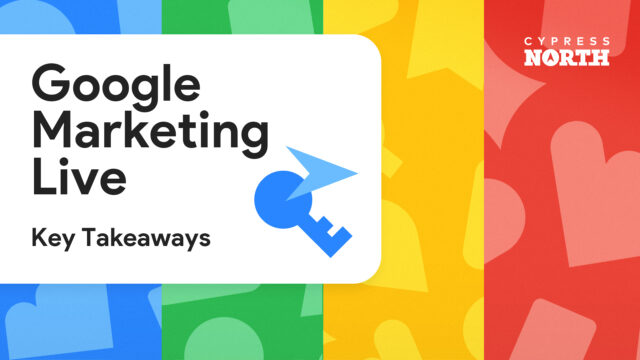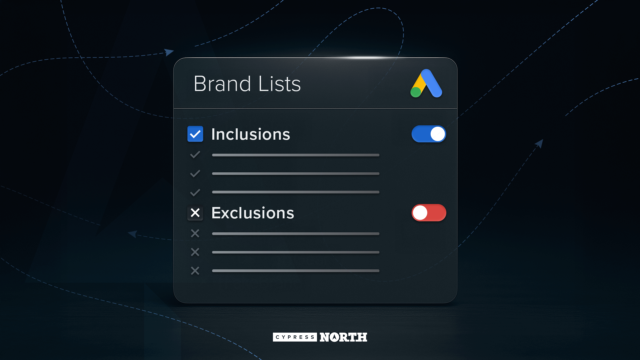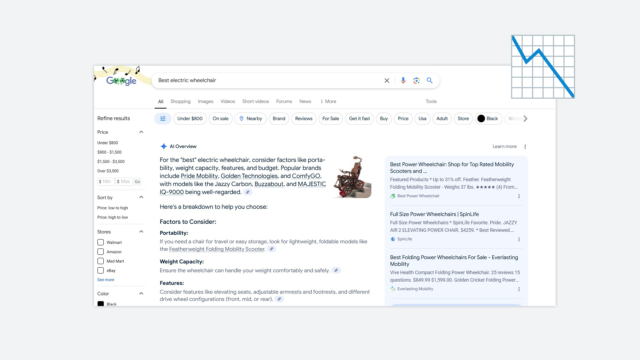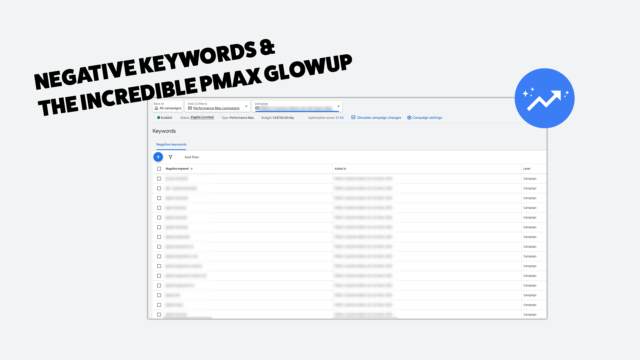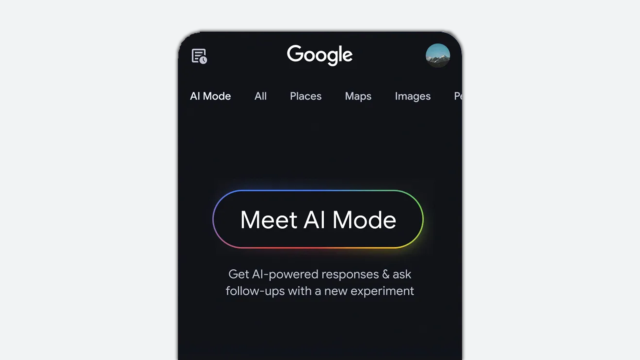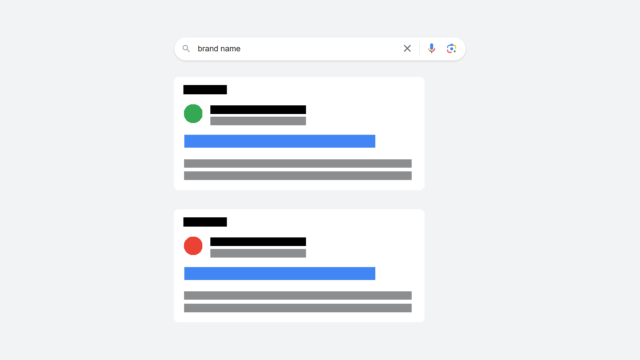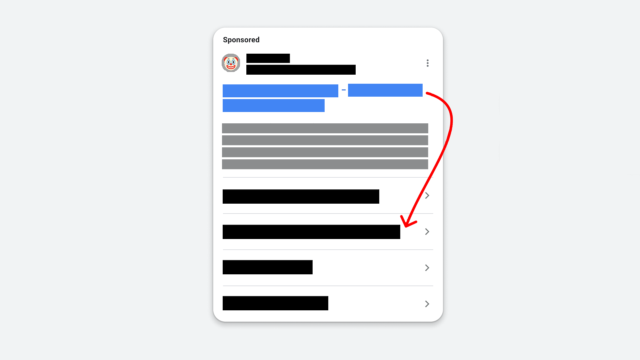Making the Case for Broad Match

Hear me out, I tested broad match keywords in Google Ads, and they’re actually converting.

I know, I know, I’m the biggest hypocrite in history. If you’ve read my book or ever listened to me rant on Marketing O’Clock, you know that I am WAS not a fan of broad match keyword targeting in Google Ads… to put it lightly.
Broad match allows your ads to show for queries that are “related to” the keywords on your keyword list, which doesn’t sound ideal to me. The beauty of search advertising is being able to target your ads based on the intent of search queries, but paying for clicks from people who are searching for things merely “related” to that intent sounds like a huge waste of money.
Yet, here I am writing this post, admitting that, like any new feature, we tested broad match … and it actually worked. Search terms that I never in my wildest dreams would have thought would convert are converting. And, we are meeting (or sometimes exceeding) the client’s CPA goals.
In this post, I’m going to explain why we tested broad match and safety nets that you can use to test it in your accounts without blowing your client’s budget.
Why we Tested Broad Match
In 2021, we lost the broad match modifier keyword match type. This was a crucial tool that we used to cast a wider net when it came to search queries. There are some products and services that people use an array of language to search for. Broad match modified helped us match with queries that, while we may not have thought to add them to our keyword list, included specific terms that signify the right search intent for our product.
We heard rumblings that some changes had been made to broad match and that it was working well for some advertisers. But it wasn’t until we took over an account where broad match was performing so well that we decided to expedite our testing. When we usually see broad match at work in a PPC audit, our hearts sink when we see the queries it matches with and the wasted spend. Switching to a more dialed-in match type is an easy win and an instant boost to performance. However, we were shocked to see that the broad match campaign in this account was converting and had a lower CPA than other campaigns with stricter keyword matching.
Could broad match be the answer to the traffic we lost due to the phase-out of broad match modified? We reluctantly decided to give it a test and find out for ourselves.
What’s Changed
There are three new criteria on the keyword matching help document for broad match. While I’m not entirely sure when this change took place, the Wayback Machine’s capture of the page from April 2020 did not include this verbiage:
To help deliver relevant matches, this match type may also take into account the following:
- The user’s recent search activities
- The content of the landing page
- Other keywords in an ad group to better understand keyword intent
However, the same page (which no longer exists) does include this information as of November 2020.
The fact that Google considers the user’s recent search activity is the most promising change in my eyes. This could mean that a user previously searched for a keyword that I’m targeting, and is now searching for something similar. If the new query is related to my keyword, but Google knows the search intent was previously a good match, I don’t mind my ad showing for that particular search.
The fact that Google Ads considers the content of the landing page also made me feel optimistic about the changes to broad match. It seems like Google is making more informed decisions when they match your keywords to a query and not simply showing ads for any related search term.
Tips for Testing Broad Match
I am in no way recommending that you switch all of your broad match modified keywords to broad match to see what happens. But, for certain accounts, for certain clients, there is a way to *safely* test broad match. Here are some safeguards you should consider.
Conversion History
I felt safer testing broad match in this particular account because it had a lot of conversion history and data for Google to learn from. If Google Ads finds similarities between previous converters and those conducting searches related to my keywords, I’m comfortable showing my ads to these searchers and paying for their clicks.
Structure
Don’t haphazardly throw broad match keywords in your campaigns with phrase and exact match and hope for the best! Put broad match keywords in their own campaign with separate performance goals. Try to make Google Ads work even harder to get this campaign to work with a lower tCPA or tROAS than you hope to achieve for your phrase and exact match campaigns.
Also, keep in mind that Google considers at other keywords in your ad group to better understand your keyword intent. Take extra care when structuring your ad groups to set Google up for success. Make sure your keyword buckets for each ad group are as organized as possible.
Google also uses the content on your landing pages as a signal for when to match queries with your broad match keywords. Structuring your campaigns and ad groups with as specific landing pages as possible will give Google more information when matching queries.
Only Use *Smart* Smart Bidding
Smart bidding can mean a lot of things in Google Ads, and many of these strategies aren’t really smart at all in my opinion. If you’re going to open yourself up to pay for clicks from people searching for queries that don’t actually match your keywords, give yourself a safety net by utilizing a smart bidding strategy that focuses on achieving your KPIs.
For lead-based accounts, an aggressive target CPA strategy is your best bet. There could be a case for maximize conversions at a very low budget to collect conversion data quickly and then switching to target CPA. For eCommerce accounts, I recommend using target ROAS and setting that target low.
If you’re asking yourself “should I try broad match?”, I’d first ask yourself if you have had success with target CPA or target ROAS. If you have, it might be worth a shot. But, set those targets even lower than you would for other campaigns. You might be surprised by the results!
In our account, our phrase and exact match campaign is still working to achieve our tCPA. But, the broad match campaign is out-performing the (even lower) CPA goal we asked Google to meet. We’re continuing to lower this CPA goal and are amazed with the results!
Be Aggressive With Negative Keywords
To be honest, I have major trust issues with Google Ads and expect broad match to give no h*cks and match with any query under the sun. Since Google hides a good chunk of search term data, advertisers often don’t know what searches are triggering their ads and can’t always negate them based on the search term report.
To help me sleep at night, we’ve been super aggressive with our negative keyword strategy for the account that is using broad match.
Negative keyword mining starts at the keyword research phase for me, based on a tip from PPC Pro (and my friend!) Andrea Cruz, I start looking for terms to exclude in Google Ads Keyword Planner. This can give you some insight into what searches Google Ads thinks are related to your keywords.
It’s also essential to add negative keywords for both your brand name and competitor terms. While you may decide to run campaigns to show your ads to users searching for either you or your competitors, these campaigns should have entirely different CPA goals. If you don’t exclude these terms, Google Ads will find an easy win and match your non-branded broad match keywords with someone searching for your brand name (i’ve seen it with my own eyes!).
You can also monitor search terms in Google Analytics (at least for now!), where with some clever maneuvering, you can see the terms that aren’t visible in Google Ads. Since we don’t know how long we’ll be able to see this data in GA, it’s also a good idea to pull search terms into UTMs as a safety measure.
Looking for more terms you should exclude? If you are running ads on Microsoft Advertising (although I don’t recommend broad match on the platform), they will show you queries, even for 0 click searches! If you see anything in your Microsoft search terms report that isn’t a good match, add it as a negative keyword in both accounts.
Observe Audiences
Finally, I highly recommend observing in-market and affinity audiences that could be relevant to your campaign. Using broad match is a great opportunity to monitor performance for specific audiences and find people to bid higher for or target exclusively down the road. These findings can be helpful for your other campaigns as well (including display, video, and discovery targeting). You won’t know how these users are engaging with your ads unless you add them at the campaign or ad group level, so observe, observe, observe!
Prepare for Bad Matching
When you’re measuring success in broad match campaigns, you have to look at the big picture. To determine whether or not it’s “working” you have to measure what matters, whether that’s a CPA or ROAS goal.
The truth is, when you look at the search term report, it will break your heart. Be sure to add negative keywords to combat bad matching, but there is only so much you can do.
On the bright side, we’ve seen keywords convert that we would have never thought would. Queries that we would have added to a negative list without a second thought have ended up converting. I have to assume Google was looking at previous searches to determine that this user was a good match for our business, and it worked!
Why Now is the Time to Test Broad Match
We all have heard the propaganda from Google since the beginning of time:
20% of all searches on Google have never been seen before!
Using broad match can save you time building keyword lists!
While this sales pitch used to make me roll my eyes, It’s time to face the facts, broad match modified is gone. The tool we used to cast a wider net and capture new ways to search for our product is not coming back. Again, I do NOT recommend using broad match to replace broad match modified keywords in all cases.
But, I am here to say that Google Ads has improved broad match over the last couple of years.
I can’t believe I’m saying this, but with the right bid strategy, a LOT of monitoring, a robust negative keyword strategy, and a few sleepless nights, broad match can work.
Meet the Author

Christine Zirnheld
Christine is our Director of Lead Gen and a co-host on our weekly Marketing O’Clock podcast. Known affectionately among coworkers and podcast listeners as Shep, she joined Cypress North in 2018 and works out of our Buffalo office.
As Director of Lead Gen, Christine oversees all of our lead generation clients, providing strategic guidance and assistance as needed to ensure we’re hitting their goals. She is on the cutting edge of paid search strategy and uses her expertise to not only uncover more quality leads for clients, but to turn those leads into customers.
Christine is an established thought leader in the digital marketing community, known for her PPC expertise and strategic mindset. She was recognized as one of the Top 50 Most Influential PPC Experts of 2025 by PPC Survey. Christine has shared her insights as a speaker at several major digital marketing conferences, including SMX Advanced in Boston, SMX London, and SMX Next. She has contributed to Search Engine Journal and Search Engine Land, and even published an ultimate playbook for Google Ads.
Originally from Ashburn, Virginia, Christine graduated from Canisius University with a bachelor's degree in marketing. She also has an associate's degree in fashion business management from the Fashion Institute of Technology.
When she’s not working, Christine can be found singing karaoke or watching Miss Rachel with her toddlers, watching Bravo, dining al fresco, and drinking Diet Coke. She’s known for making her Taylor Swift fandom her personality, talking about the royal family to any of her coworkers who will listen, and reading books about wives who kill their husbands. Christine was the 2002 Hula Hoop Champion at Ashburn Elementary School – and may still be undefeated.


